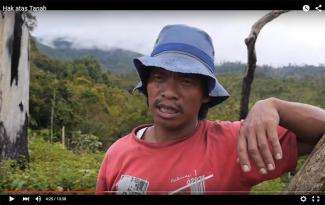Far before Indonesia emerged as a state, adat communities living in the archipelago have managed and protected their area. Ironically, until today, only few adat communities' rights over their area is recognized; about 70% of Indonesian land is claimed as state forest.
State land and state forest was a colonial principle that sustained by the post-colonial government. The land use policy is more favorable to company's interest rather than to the community. It is clearly seen from the large scale expansion of plantation and mining; degradation of million hectares of Indonesian forest, and continuous land conflicts.
A video released by LifeMosaic, is designed to show communities' conversations in testing individual land right and community concessions in state land; the two tenure systems proposed by the state. The video also examining the recognition of collective rights over adat area; an option has been longed for by the adat community.
The video tell the story of adat community in Latin America and Africa. Masai community in Tanzania, Africa obtained individual certification for their adat land and this has degraded their culture. The individual land ownership threatened Masai social capital that have served as a basis for their community for decades.
Community Concessions on State Land
Village forest is a government's scheme that provide community with cultivation right in limited period, without the ownership right. To obtain village forest, community must submit their proposal to the government.
Adat area in Merangin, Jambi is an adat area which is included as state's land. The community submitted village forest proposal to the government, and they obtained almost 50 thousands hectares of village forest area over their descendant's area. This community's concession is valid for 35 years.
“The community today earn their use right, but the control is still under the government. We hope that through this program, land is not for sale (we can keep our access), and our children and grandchildren can still get benefit from our land in the future,†Sudirman, a Merangin people, Jambi explain.
Many parties see that community concession such as village forest is a step forward to improve adat community rights. However, some other see that the use rights is not sufficient.
For AMAN (Indigenous Peoples Alliance of the Archipelago), community concession is a step backward. Abdon Nababan (AMAN secretary general) states that the decision of Supreme Court no 35/PUU/2012 clearly states that adat forest is not a state forest; therefore, we have to decline any government scheme aimed to keep adat forest within state forest.
“I think; by the issuance of MK Decision no 35, there should be no more conversation on village forest and community forestry inside adat areaâ€, Abdon further stated.
Other form of land right is individual ownership on a parcel of land owned by a family or an individual. This parcel of land could be obtained through inheritance or government's certification program. Individual land right serve as an evidence in land buying and selling transaction, and can be used as collateral. Individual land certification programs have gained global support; however, many believe that this type of right have a high risk for the community.
Ansaruddin, Penunggu Community, North Sumatera stated “When we have the certificate, it is easy and tempting to use it as collateral to get loan from bank or broker. When we do not have the money to repay the loan, the bank or the broker will seize our adat land. Adat community's demand is not land certificate, instead, our demand is recognition and protection over our rightâ€. Penunggu Community refuse individual certification and opt for collective land management.
Collective - Communal
Collective rights refers to legal ownership and management of land by the whole community. Communal area is under adat authority and adat organization. This communal land cannot be sold and divided. There are different types of land use can be employed in this communal land: settlement, farm, and conservation area
The world's adat communities agree that communal rights substantially reflect adat relation and the spiritual relation with their land and area. Many Latin America's countries recognize communal certification. By doing it under communal right, the community are able to protect their culture and sustain their organization.
In Indonesia, currently there is no established communal certification procedure. The Indonesian government is currently working on this.
Source: This article is re-written from Wilayah Community Living Space - Land Right Video by LifeMosaic




